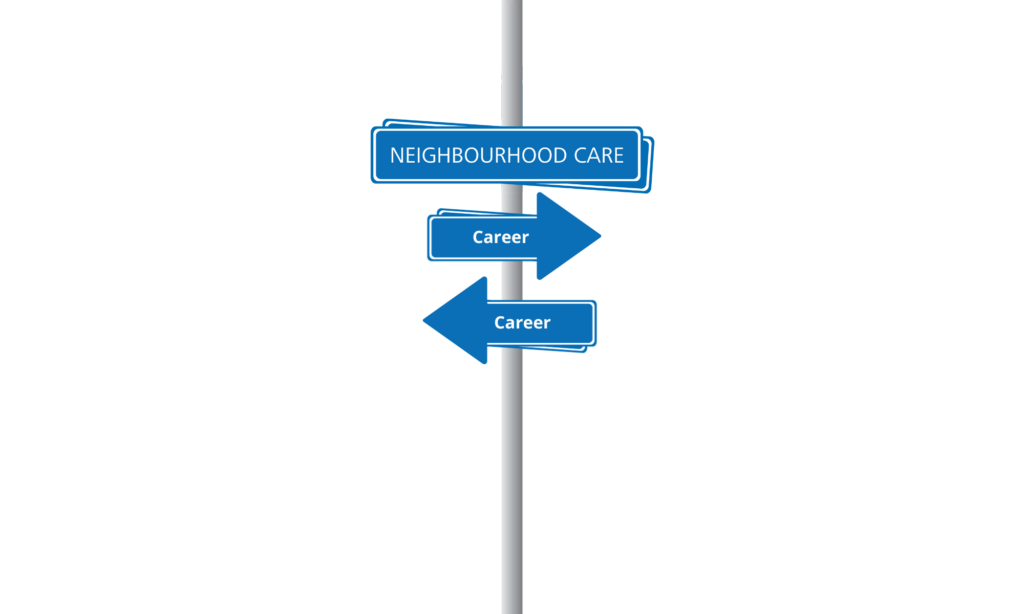At Neighbourhood Care as part of Buurtzorg, the traditional hierarchical organisational structure has given way to a more dynamic and flexible approach: the flat organisation with self-managed teams. The traditional concept of career by moving upwards in a hierarchical structure is replaced with a more fluid and dynamic approach to career paths. As the modern world is moving quite quickly to all kinds of flat organisations, in this blog I want to explore the diverse career opportunities that come with it.
One of the most exciting aspects of a career in self-managed teams is the relatively easy access to personal and professional growth. Taking on a variety of responsibilities and developing a broader set of skills will make you a more flexible and resilient professional. In addition, working closely with colleagues fosters a strong sense of camaraderie and mutual support, which increases job satisfaction and overall well-being.
A self-managed team is a group of individuals who work together to achieve shared goals, without the need for a traditional manager to oversee their day-to-day activities. Instead, decision-making and responsibility are divided among team members. Rather than having a single designated manager, leadership roles rotate among team members. At Neighbourhood Care we call these the Informal Roles; a role you will hold for about 6 months and then it will rotate to someone else on the team. Through this approach you develop your organisational, coordination and leadership skills and you gain experience in guiding and motivating your teammates.
Self-managed organisations value personal growth and autonomy and life-long learning is an important part of this. Anyone in the organisation can define their own career paths based on their individual goals, interests, and strengths. This may involve taking on stretch assignments, exploring new roles or responsibilities, or pursuing passion projects. This allows you to broaden your skills, expand your network, and gain exposure to different perspectives and experiences. You can proactively seek learning opportunities, attend workshops, take online courses, and participate in conferences to acquire new knowledge and skills. The constant exposure to different aspects of the team’s work nurtures a culture of continuous learning and self-improvement. You are able to take responsibility for your own professional growth that suits your life and your stage of life, thereby automatically prioritising your work-life balance and well-being.
A great aspect of self-managed teams is that by design it encourages entrepreneurial thinking and innovation. Everyone can identify and pursue new business opportunities, propose and implement initiatives, and contribute to the organisation’s growth. This could involve developing new services, exploring new markets, or implementing process improvements. We encourage out-of-the-box thinking and innovation with a flair for creativity, contributing with fresh ideas, brainstorming solutions, and implementing new approaches to challenges.
Currently, we are looking into specialist roles or Subject Matter Experts. These are team members with specialised knowledge and expertise that can work inter-team. For example, a specialist in Onboarding of Clients. This is a complicated process that touches many stakeholders and system aspects and for which you need various skills to do it well and you have to do it regularly. The Subject Matter Expert will play an important role in problem-solving, mentoring, and elevating the teams overall performance.
With flatter hierarchies, self-managed teams provide a nurturing environment for mentorship and coaching. Experienced team members can take on mentorship roles, guiding new or junior members, helping them grow professionally, and providing valuable feedback. The role of the Coach is particularly important in the Buurtzorg model and preferably the coaches are recruited from within. When the number of teams continues to grow, the need for more Coaches is a logical consequence.
Choosing a career path in self-managed teams opens up a world of possibilities. It empowers everyone to take charge of their growth, fosters collaboration, and promotes a sense of ownership in the team’s success. I realise that as an organisation we are still young and small and cannot yet provide the full support we would like. But let’s embrace the opportunities that self-managed teams have to offer and unlock a future where your career is truly in your hands.





